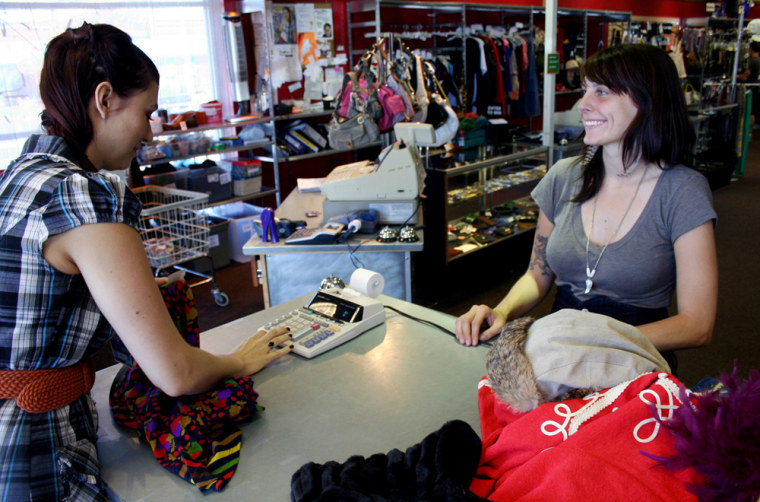So maybe money’s been tight lately. Really tight. If the thought of meeting your family’s needs or bankrolling the holidays in the coming weeks is leaving you with a pit in your stomach, here’s an idea: Embrace bartering.
Seriously. The art of bartering — that is, exchanging stuff and services for other stuff and services without spending any money at all — is becoming huge. People are bartering almost anything and everything imaginable these days, from roof repairs to legal services to Pilates sessions to hotel accommodations to baby-sitting shifts.
And if you’re just plain hard up for cash, you can always make money off of your stuff as well. It’s not all that hard to do with the help of eBay, craigslist, garage sales and consignment stores.
Intrigued? Consider these tips.
1. Figure out how to swap with local people. Whatever it is you’re interested in bartering — from clothes to books to DVDs to home repairs — it’s relatively easy to find people who live near you and who share similar interests. Try these sites: Meetup.com; U-Exchange.com; the barter section of craigslist for your area; BabysitterExchange.com, which can help you swap baby-sitting services with people in your area; and The Freecycle Network, which advocates gifting to help the environment and may be able to direct you to local trading or bartering organizations.
2. Plan a clothing-swap party. It’s shockingly fun to jazz up your wardrobe with a whole bunch of new items while offloading neglected clutter from the back of your closet at the same time — without spending anything! You can organize a night to swap clothes with a group of friends, or you can find a clothing swap through Meetup.com. (Find more tips here.)

4. Time your swaps or sales with care. Certain items are bound to be hot sellers at certain times of the year — and absolute duds at other times. For example, right this minute you could cash in by selling old Halloween costumes. In the coming weeks, you could make money by offloading winter clothing and ski gear. Cool vintage dresses may get snapped up around prom or homecoming seasons. Call consignment stores in your area to find out what kinds of items are being sought at any given time of the year. After gathering that intelligence, recognize that you could sell those same items for profit through sites such as eBay and craigslist, or at a garage sale that you orchestrate.

6. Growing weary of waiting for your home to sell? This whole swapping thing is so big that you actually can trade homes with someone else. Don’t go down this path without legal representation, though. To learn more about this possibility, visit GoSwap.org, Pad4Pad.com or DomuSwap.com. In addition to hiring a lawyer for this transaction, it also may be wise to employ a licensed “exchangor” to help you navigate tax land mines. To find one, visit the Web site of the National Council of Exchangors.
7. Exchange homes for your next two-week vacation. OK, so maybe you don’t want to trade your home forever. But why not try it for your next trip? Home-swap networks allow you to swap homes with people who live where you want to vacation. You can literally save thousands of dollars on a vacation by eliminating hotel costs altogether. To learn more, do an Internet search for the words “home swap” or “home exchange.”
8. Don’t ever pay for books again. Book clubs such as PaperBackSwap.com make it possible for you to mail a book and get a book in exchange, with no strings attached. At Swaptree.com, you can trade books, CDs, DVDs and video games. Sweet!
9. Protect yourself. Be extremely careful about shipping anything valuable to a complete stranger, especially before you’ve had an opportunity to see what you’ll be getting in exchange. If you’re swapping inexpensive goods, then shipping those goods probably isn’t such a risky thing to do; otherwise, make plans to make the trade in person so you can inspect everything before the deal is final. Meet up in a public spot, such as a restaurant or coffee shop, and bring someone with you for safety reasons.
10. Be aware of the tax implications. Particularly if you are in business and are trading products or business services with someone else, those transactions must be reported to the IRS as income. To make matters a little less complicated for you, barter clubs usually will monitor your trades for you and send you paperwork at the end of the year. For more details about bartering and taxes, visit this IRS site. To get started with this type of bartering, contact your local chamber of commerce and inquire about a local barter exchange, or visit the Web site of the International Reciprocal Trade Association and click on Membership.
Sources: